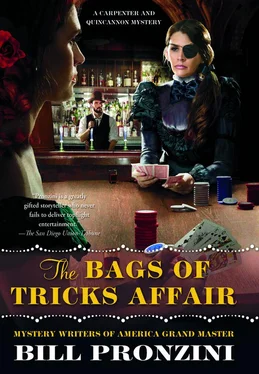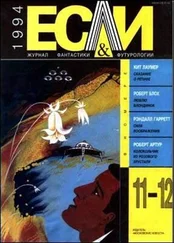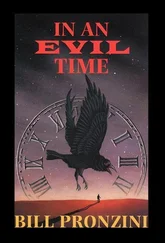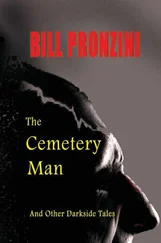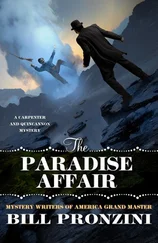Quincannon reset the door lock when he left the flat, hurried downstairs. When he emerged onto the porch, he encountered the Christophers, Everett and Letitia, just returning from their day’s outing. He assumed a neutral expression as they met at the foot of the steps.
“Mrs. Carpenter isn’t home,” he said, “and I very much need to speak with her. Would you have any idea where she might be?”
Plump, dark-haired Letitia Christopher said, “I’m sorry, no. We’ve been away all day visiting my mother in Oakland.”
“When did you last see Mrs. Carpenter?”
“Well... I’m not quite sure.”
“At any time yesterday?”
“No. It must be, oh, three days.”
“At least that,” her husband said.
“Did you happen to notice if her lamps were lighted last night or Friday night?”
They hadn’t. Good neighbors, the sort that tended to their own affairs and respected the privacy of others. Hell, damn, and blast!
Quincannon bid them good evening, climbed into the rented buggy. And sat there, his large hands gripping the reins almost as tightly as he would have gripped Jeffrey Gaunt’s neck.
What now? Maintaining a passive vigil here was out of the question. Even if he’d had the patience for it, it would surely prove futile. Sabina was not going to come to him under her own power, not tonight, not at any time in the foreseeable future. He had to find her. And to do that, he had to find Gaunt. How to accomplish it, where to begin? Formidable task in a city this size, one that seemed insurmountable.
But it wasn’t — he wouldn’t let it be.
She had to be somewhere.
Where?
At first she’d had no idea where she was imprisoned. Now she did, after two long, miserable days and a third just beginning, but the knowledge did her no good. She still had not found a possible means of escape.
She had run a gamut of emotions during that interminable period. Disorientation when she’d awakened on a filthy cot after God only knew how many hours of unconsciousness, her head aching abominably, her mouth dry and her throat parched — the aftereffects of the ether. Confusion when her vision cleared enough to penetrate the gloom of her surroundings. Bewilderment that she had been brought to a place like this and left here alone. Fear that she had overcome and continued to hold at bay by sheer force of will. Disgust at herself for not paying closer heed to John’s concerns, the lapse in caution that had allowed Jeffrey Gaunt to catch her as he had. Anger at him that had grown into an alternately hot and cold, sustaining fury.
Except for the ether, he hadn’t abused her in any other way. Her body bore no marks or wounds, and her clothing was intact, hardly disarrayed at all, when she awakened. And there had been no sign of him since; he had left her completely alone in this place with no food, no water, not even a blanket to help take away the night’s chill.
He had locked her in here to die.
Why, instead of simply doing away with her by gunshot or some other lethal means? Initially she’d thought that he might be squeamish about killing a woman in a direct confrontation, and so by employing this method he avoided blood on his hands. Now she was convinced that the kidnapping and imprisonment were by coldly calculated design. His pose as a Southern gentleman disguised his true nature — a sadistic shell of a man lacking all human feeling other than his warped protective love for his sister.
If Sabina simply disappeared, foul play could not be proven against him. And when she failed to appear to give her damning testimony at Lady One-Eye’s trial, the chances of acquittal would increase considerably. He would then have his revenge and his sister’s freedom, both. And once again he would get away with cold-blooded murder, damn his black soul, for there could be little doubt now that he was responsible for the deaths of the gambler in New Orleans and the landowner in San Antonio.
One other emotion had been born of this understanding — an unwavering determination not to let his plan succeed. She would not die in this foul place. She would not. She would not.
And foul it was, literally. Cold, damp, dirty, rife with an array of rank odors that she had identified one by one: salt water, rotting wood, dust, paint, linseed oil, turpentine, rodent and bird droppings. Rife with sounds, too: the creaks and groans of old wood, the lapping of water close by outside, the chittering and scurrying of rats. Sabina had seen some of them, red-eyed shadows flitting through the daytime gloom.
The long nights were the worst. She lay wrapped cocoonlike in her evening cape, sleeping only fitfully for short periods before some sound brought her awake. Her loathing for rats was not as intense as in many women, those who would cower and swoon at the mere thought of a rodent large or small, but when she heard the creatures moving in the thick darkness she couldn’t help imagining that they were about to pounce on her, tear into her flesh with their sharp teeth and claws.
Rationally she knew this would not happen — not yet. Despite more than two days without food and water, she had lost little of her strength. Whenever one of the rats seemed to venture too close, she hammered the floor with the length of rusty pipe she’d found to frighten it away. But if she remained trapped here another two, three, four days, the rats would sense her weakening condition and eventually they would attack.
Hunger was bad enough, painfully cramping her empty stomach, but thirst was worse by far. Her mouth and throat were so arid this morning she had difficulty swallowing. And the dampness and sinus-clogging dust made breathing painful.
As on the previous two mornings, it had been the moans of foghorns mounted on buoys in the bay and the shrieks of seagulls that had awakened her. She lay shivering until a paroxysm of dry coughing prodded her into a sitting position. When it subsided she stood, adjusted her now filthy cape with cracked and blistered fingers, then spent a little time flexing her arms and legs to free them of stiffness.
She could see well enough again now that the night had ended. There was a ragged, foot-wide hole in the roof — possibly created or enlarged by the small marsh birds nesting in the rafters, or by gulls trying to get at eggs in the nest — that admitted a funnel of daylight. And a score of thin threads and ribbons of gray daylight came through chinks in the warped wooden walls. Heavy shadows still crouched in corners and among the rafters, shrouded the contents of the cavernous building.
Her explorations had identified it for her. It was or had been a repair shop for boats, the rear half of the warehouse section built on pilings. An isolated derelict situated at the edge of the bay — the salt smell that permeated the structure and the lapping of wavelets beneath the floorboards told her that — but just where she couldn’t be sure.
How had Gaunt found it? He hadn’t been in San Francisco long enough to go scouting in unfamiliar territory. Or was it unfamiliar to him? Had he been here before in his travels? Unlikely, given the information the Pinkertons had provided on his past activities; Sacramento and Grass Valley must be the farthest west he’d ventured until this past week.
He must know someone in San Francisco, then, someone who had told him of this derelict shop and supplied him with keys. Sabina couldn’t imagine who, but it didn’t really matter now. Any more than it mattered where Gaunt had gone after depositing her here, whether or not he was still somewhere in the city. Unless he came to check on her, make sure she hadn’t escaped. If he did, she thought with a fresh surge of fury, he would find a pipe-wielding hellcat waiting for him.
Читать дальше
